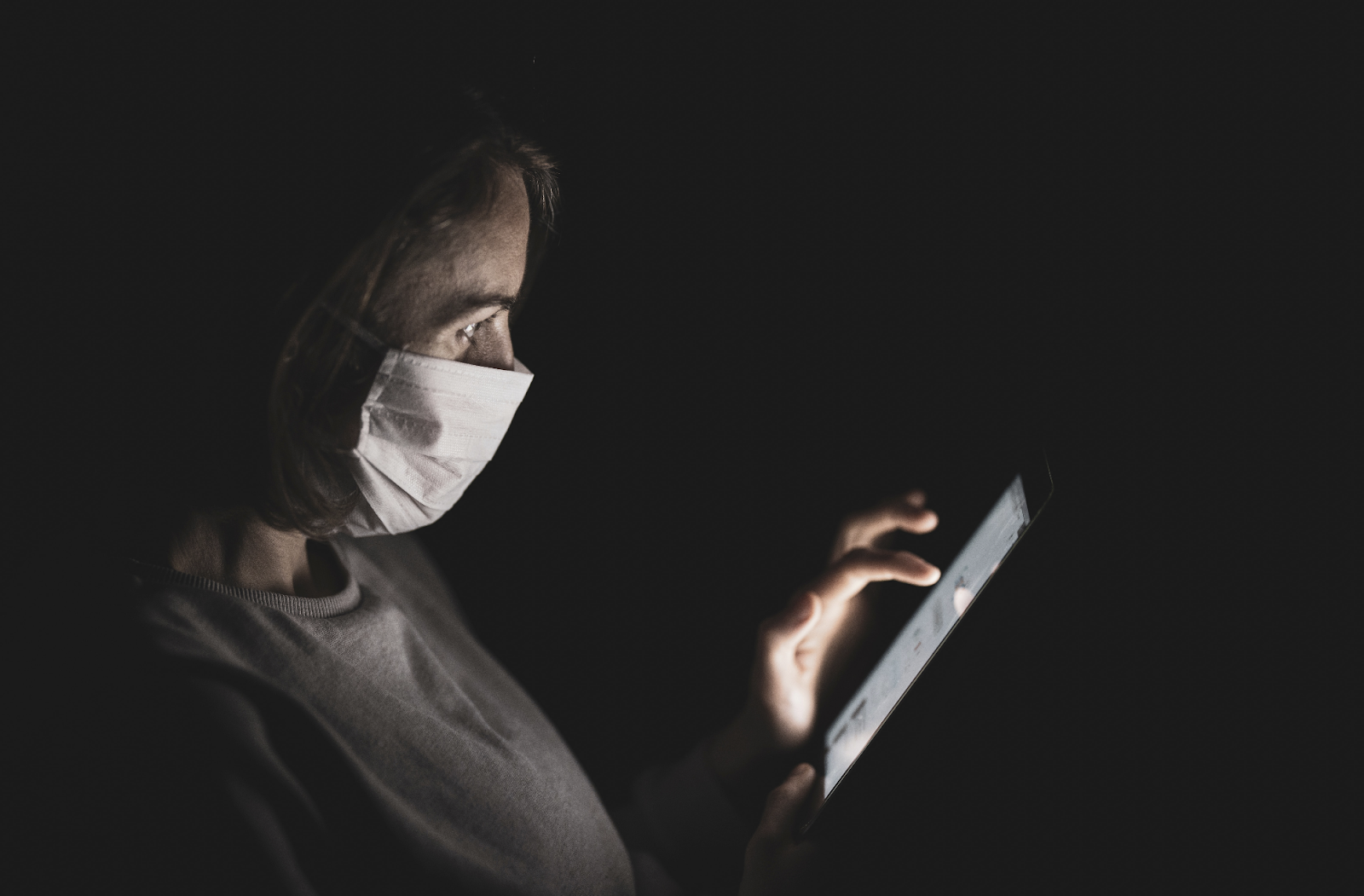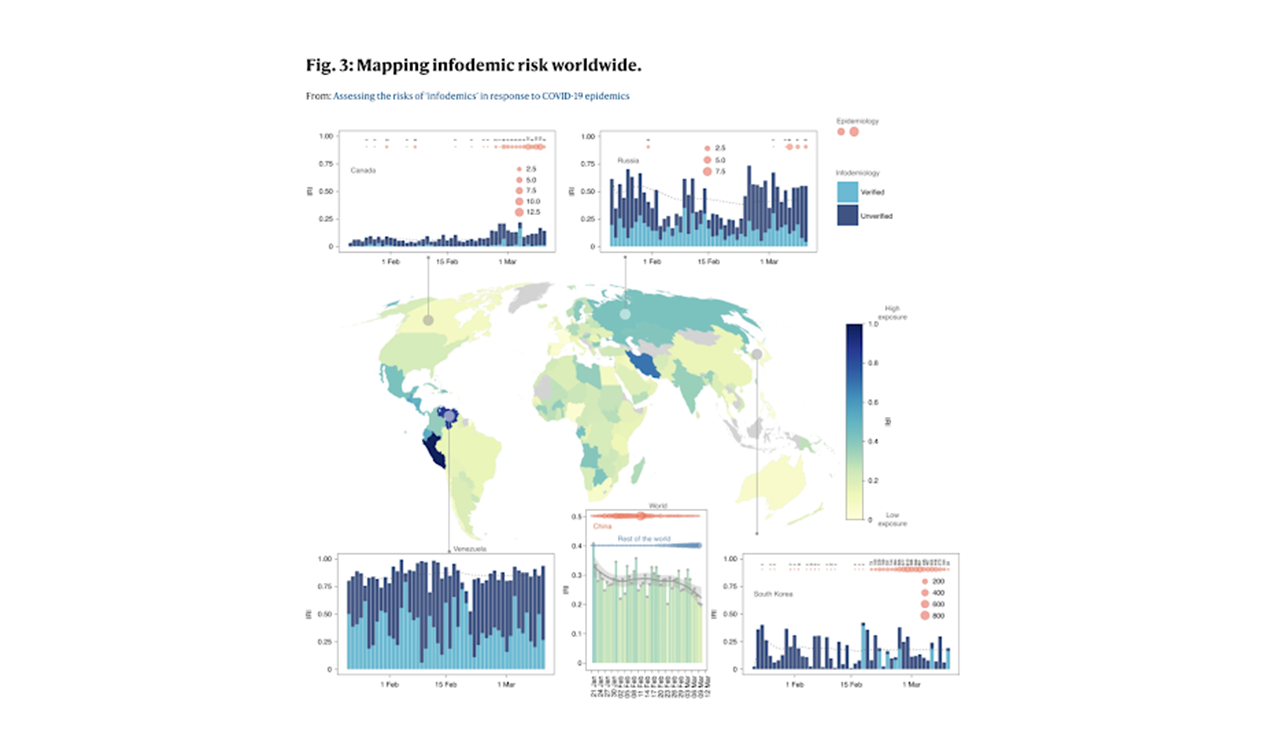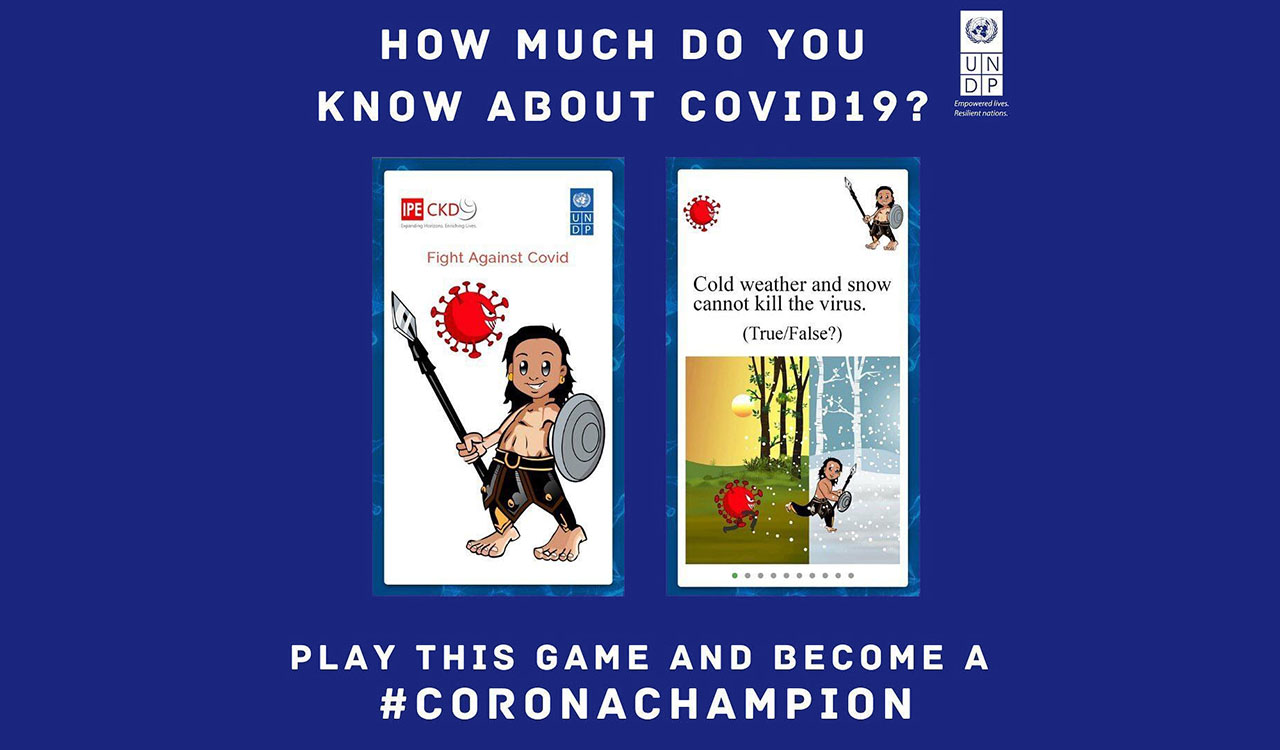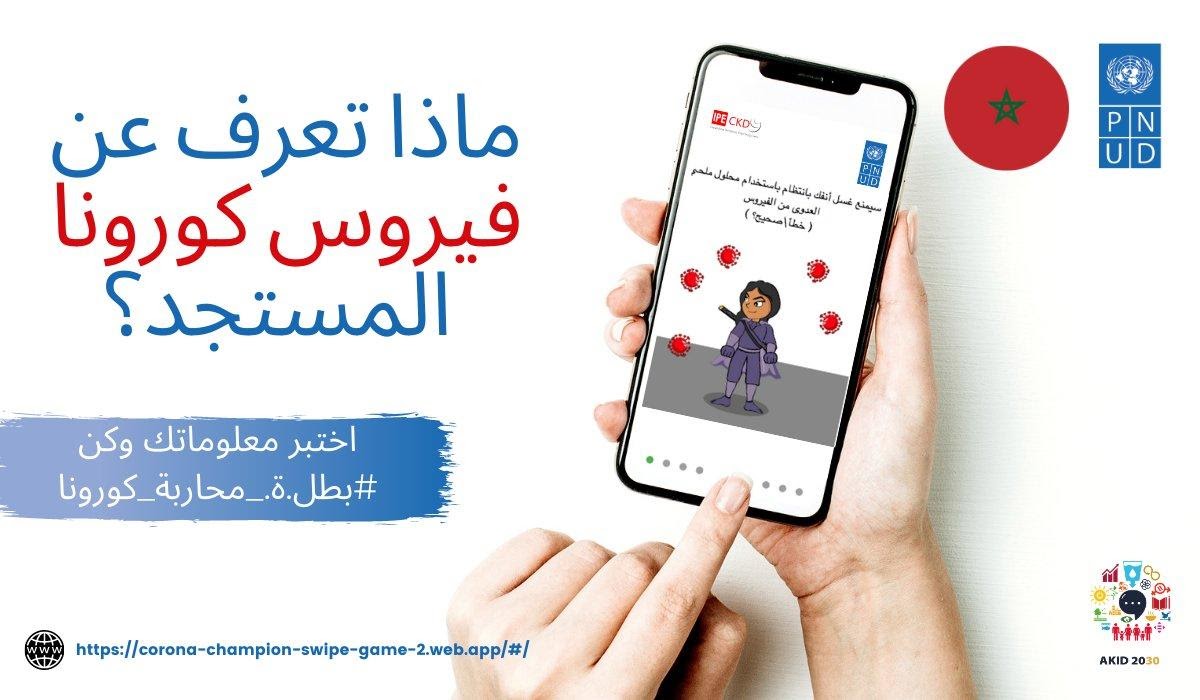From India, to Morocco, Cabo Verde, and Timor Leste
The Learning Network Effect: Gamification to counter COVID-19 Misinformation
January 26, 2021
Lockdown Gaming
To reduce the spread of the COVID-19 pandemic, the world has gone into isolation -- bringing major changes to our daily lives and a new appetite for digitalization. Mandated lockdowns and social distancing interventions have led us to dramatically increase the number of hours we spend in front of our screens to work and connect to our loved ones.
Deloitte’s 2020 digital media trends survey suggests that since the beginning of the crisis, over a third of consumers globally have for the first time either subscribed to a video or a cloud gaming service, watched esports, or joined virtual sporting events. Half a billion people played Among Us in November 2020, beating giants like Pokemon Go and Candy Crush. 20% of all mobile game downloads in the world this year were from India. This is more than a circumstantial phenomenon, it's a turning point.
The gaming industry has started to see opportunities to promote healthy physical distancing, hand hygiene, and other preventive habits to curb the spread of COVID-19. Some companies are crowdsourcing gamers to help researchers better understand COVID-19. Others are creating solidarity response funds to support medical workers, educators, children, and creative professionals at risk or those who have been adversely affected by the pandemic.
The UNDP Accelerator Lab network has been seeing digital opportunities since the beginning of the COVID-19 pandemic. The labs have powered UNDP for fast action by conducting various experiments that utilize digital technologies to prevent the transmission of COVID-19 (check out the work in Pakistan with the behavioral analysis of health messages tested on phone lines and in Cabo Verde via an app delivering official information about the virus). It also supports the socio-economic recovery of the most impacted populations, such as women-led small enterprises in Palestine, informal market vendors in Uganda, food producers in Zimbabwe, and vulnerable families in Ecuador.
Recently, the UNDP Accelerator Labs in India, Morocco, Cabo Verde, and Timor-Leste teamed up to use gamification and digital technologies to combat COVID-19 misinformation.
An emergent challenge: Infodemic
As COVID-19 keeps spreading across the globe, countries worldwide have been flooded with misinformation, fake news, prejudiced and unverified information about the disease. And even more alarming is the speed and pace at which false information travels. In 2018, a team at the Massachusetts Institute of Technology (MIT) demonstrated in a surprising research that “false news stories are 70 percent more likely to be retweeted than true stories are.”
The World Health Organization explains that “an infodemic is an overabundance of information, some accurate and some not that makes it hard for people to find trustworthy sources and reliable guidance when they need it. It poses a serious problem for public health since people need this guidance to know what actions to take to protect themselves and others, and help mitigate the impact of a disease.”
“We’re not just fighting an epidemic; we’re fighting an infodemic.” Tedros Adhanom Ghebreyesus, Director-General of the World Health Organization (WHO)
As COVID-19 keeps spreading across the globe, so does the risk of infodemic. Research available here: https://www.nature.com/articles/s41562-020-00994-6/figures/3
In India, misinformation spreads like wildfire on ubiquitous platforms such as WhatsApp. For instance, dangerous messages circulated about miracle cures using herbs, alcohol, or cow urine with the false promise of protecting the population from COVID-19. Worse, conspiracy theories accused minority groups of spreading the virus.
As misinformation and stigma impact lives, it becomes urgent for national and global organizations to combat misinformation and promote accurate information.
CoronaChampion 1.0: Debunking Myths Gamification Style
Tapping into the trends seen within the gaming and digital industries, UNDP India, through its Accelerator Lab, decided to tackle the surge of COVID-19 misinformation and fake news with gamification.
“While our medical COVID-19 warriors fight the pandemic. We as citizens can take action to fight the infodemic together.” Rozita Singh, Head of Solutions Mapping, UNDP India Accelerator Lab
Together wih IPE Global Centre for Knowledge and Development, the UNDP India Accelerator Lab developed CoronaChampion 1.0 a web app game aimed at debunking myths around COVID-19. It targets specifically active social media users, youth groups, community champions, students, and civil society organizations spreading awareness on COVID-19.
The mobile game is intuitive and educational thanks to a very simple user experience. The users are presented with 10 statements about COVID-19 and need to assess if they are true or false by swiping right or left with an avatar, the Corona Champion boy. After every swipe, the result and a brief educational explanation are provided. Simple gameplay, simple language.
The CoronaChampion 1.0 was initially developed in English and later translated into seven Indian languages – Hindi, Bangla, Tamil, Gujarati, Telugu, Marathi, and Malayalam. The first version gained popularity: 10,000 users played the game within the first month of its launch.
From India to Morocco, Cabo Verde and Timor-Leste
When the Indian team shared the initiative with the UNDP Accelerator Labs Network the learning network effect was immediate! Few weeks later, the CoronaChampion 1.0 game was adopted by UNDP Accelerator Lab teams in Morocco, Cabo Verde, and Timor-Leste, adapted to the local contexts and translated it in Tetum, Creol, French, Portuguese and Arabic.
“The CoronaChampion game was one of the first collaborations carried out in partnership between various UNDP Accelerator Labs. We started a collective intelligence process with the teams in India, Morocco, and Timor-Leste, who saw the game’s potential. We improved the first version and were able to develop a second iteration.” Sofia Silva, Head of Exploration, UNDP Cabo Verde Accelerator Lab.
In Morocco, the UNDP Accelerator Lab team launched the CoronaChampion 1.0 game as part of a UNDP initiative called AKID2030 - COVID-19 (Arabic for certainty). This UNDP platform engages young people to explore the extent to which myths around the pandemic are unverified while they learn factual information. The game has caught on. Celebrities, artists, medical doctors, youth leaders, students, writers, journalists, academia, and regular citizens are partaking in developing uplifting messages, sharing quality information, and putting confirmed facts at people’s fingertips.
“When we looked at how young people spend much more time scrolling social media feeds and are more likely to believe and share pandemic related misinformation, we were hooked to the idea of using gamification to attract young people’s attention.” Najoua Soudi, Head of Solutions Mapping, UNDP Morocco Accelerator Lab
The UNDP Cabo Verde Accelerator Lab deployed the CoronaChampion 1.0 game to get young people’s attention too. It was released in Portuguese through various social media apps such as Viber, Whatsapp, Facebook, and Instagram. The team also reached out to schools and universities to reach more children and teenagers.
And in Timor Leste, the UNDP Accelerator Lab team launched the game together with the Ministry of Health. Director-General Mrs. Odete Da Silva Viegas saw it as a way to provide life-saving information and to help reduce panic and anxiety in communities. Since then, the Ministry of Health promoted the CoronaChampion 1.0 through their newly developed Whatsapp ChatBot, supported by Catalpa International, an International NGO in Timor-Leste. The chatbot has been used by +10,000 people in Timor Leste, asking over 173,000 questions about the virus and how to prevent its spread.
“Some people were amazed by the fact that eating garlic will not prevent them from being infected by COVID-19. It was so obvious for most Timorese to use garlic as medicine but in this case, eating garlic is not a cure.” Grazela Albino, Head of Solutions Mapping UNDP Timor Leste Accelerator Lab
CoronaChampion 2.0: taking on gender inequalities
The Accelerator Lab in UNDP India then launched a CoronaChampion 2.0. This second version features a girl avatar and explores the impact of the pandemic on women and girls disproportionately affected by extreme poverty, precarious economic security, unpaid care duties and domestic violence.
Within a few weeks of its launch and promotion, the game was exposed to 6 million individuals. Over 18,000 people played the game, 11,000 of whom were under the age of 19. This second version is available in 12 languages.
“An immersive experience like CoronaChampion gives everyone a chance to assess their choices and preferences with regards to personal protective behavior and facts about COVID-19.” Dr. Saurabh Dalal, National Professional Officer, on Emergency, Risk & Crisis Management at WHO, India.
The Learning Network Effect in Action
UNDP Accelerator Labs in India, Morocco, Cabo Verde, and Timor-Leste turned their ideas into a collaborative experiment. This experiment affirms how gamification works when designed with and for users. The game's simplicity was one of the key factors that led to faster adoption across various countries. We also think that having the game hosted in a simple web link, available in local languages, and having no requirement to download an app were additional reasons why it worked. To this date, the Corona Champion game (version 1.0 and 2.0) has reached more than 6 million young individuals exposing them to accurate information on the virus. The labs are seeing more opportunities to use gamification in various thematic areas of their work. Perhaps in the future, there may be opportunities to embed “gamification” elements such as ranking and badges to inspire positive competition.
The CoronaChampion initiative is only a glimpse of the opportunities the Accelerator Labs can bring when working together. It’s the reason why UNDP established the Accelerator Labs, the world’s largest and fastest-growing learning network, to collaborate, learn from each other, build solutions and adapt them to one another, and accelerate the network’s collective efforts to combat COVID-19 and keep up with the new pace of change.
To play the game:
Version 1: here
Version 2: here
With thanks to our UNDP Accelerator Lab colleagues for their contributions:
Swetha Kolluri, Head of Experimentation, UNDP India Accelerator Lab
Dr. Krishnan Srinivasaraghavan, Head of Exploration, UNDP India Accelerator Lab
Najoua Soudi, Head of Solutions Mapping, UNDP Morocco Accelerator Lab
Sofia Silva, Head of Exploration, UNDP Cabo Verde Accelerator Lab
Grazela Albino, Head of Solutions Mapping UNDP Timor Leste Accelerator Lab
— — —
Get in touch and join our conversations online.
UNDP Accelerator Labs Network @UNDPAcclabs
Find out other UNDP Accelerator Lab initiatives tackling digital misinformation here: http://bit.ly/acclabsHIPprojectMedium

 Locations
Locations







